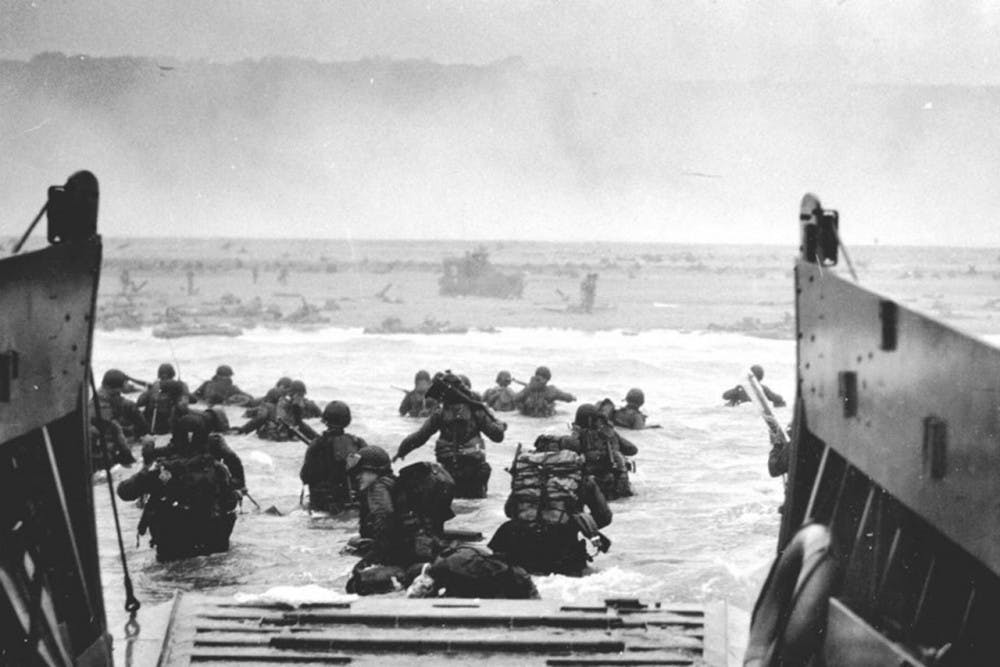Total Allied troops who landed in Normandy: 156,115
American: 73,000 (Omaha and Utah beaches + airborne)
British: 61,715 (Gold and Sword beaches + airborne)
Canadian: 21,400 (Juno Beach)
Total Allied airborne troops (included in figures above):
23,400
Total Allied aircraft that supported landings:
11,590
Total naval vessels in Operation Neptune:
6,939
Soldiers’ home nations:
United States, Britain, Canada, Belgium, Norway, Poland, Luxembourg, Greece, Czechoslovakia, New Zealand and Australia (+177 French commandos)
With more than 150,000 Allied troops landing on the beaches of Normandy — Utah, Omaha, Gold, Juno and Sword — D-Day marked the beginning of the Allied invasion of northwest Europe, eventually leading to the defeat of Nazi Germany a year later.
Thursday marked the 75th anniversary of the D-Day landings, the name given to the first day of the Normandy landings of June 6, 1944.
The significance of D-Day:
“A tremendous logistical, technical and strategic accomplishment” was how Kevin Smith, associate dean of the College of Sciences and Humanities described the landings.
World War II and the Normandy landings still occupies “this mythological space in the way that we understand ourselves as Americans,” Smith said.
Michael Hicks, George and Frances Ball distinguished professor of economics and director of the Center for Business and Economic Research, said in an email D-Day “was pivotal because it ensured the end of Nazi Germany and foretold a U.S. presence in Europe that would last 75 years.”
Hicks said his wife’s uncle served during the D-Day landings and his younger brother and daughter currently serve in Germany.
“That’s three uninterrupted generations of Americans who’ve been in Europe and three consecutive one[s] who have fought there,” he said.
The success of D-Day prevented a more prolonged war, the use of atomic bombs in Europe, USSR’s iron curtain extending deep into western Europe, far more casualties and a far slower recovery for economies around the world, things Hicks said “would have radically changed the world as we know it today.”
“With D-Day we rapidly beat Nazi German … and established a western role in Europe that eventually ended the Cold War,” he said.
Ken Hall, professor of history, said in a press release D-Day was significant in setting in motion a major transition in global history — the United States becoming significant in a world previously dominated by European and Japanese colonialism and later being able to restrict post-war communism.
Hall also reflected on the impact of the Allied victory in World War II on the American people.
“Certainly, World War II had significant consequence in the United States as so many Americans fought in the war and women assumed employment as replacements for servicemen,” he said. “Most of the American military had very little global knowledge and traveling internationally was well-beyond most Americans’ possibilities.
Wartime production helping overcome the aftermath of the Great Depression, post-war industrial productivity and employment opportunities providing Americans with a better life and increasing immigration to the United States, improvements in American education, the post-war house building boom and industrial expansion, Hall said were some effects of the war on the United States.
Therein D-Day was a significant point of transition in American history as Western and wider global civilization re-centered in the United States, he said.
Present state of U.S.-Europe relations:
While the two sides of the Atlantic have maintained a relatively peaceful relationship since the end of World War II, Smith said this 75th anniversary is “a poignant moment” to review the relationship and “recognize that right now the relationship is at a lower point than it often is.”
Smith also pointed out that it is easy to forget criticisms Europeans had of presidents like Jimmy Carter and Ronald Regan in the 1980s and American resentment of France’s lack of support for the Iraq War in the early 2000s, even proposing renaming French fries, freedom fries for a while.
He classified the history of U.S.-Europe relations as “a complicated relationship” yet an “an interesting marriage.”
Hicks said while President Donald Trump’s “unusual approach to diplomacy and his rhetorical style” were reasons why U.S. relationship with NATO and other European allies were mostly strained, issues like the current trade war will not have significant impact on the relationship “since they are neither the target nor participant in most of the deep tariff issues.”
While the European nations in NATO have contributed militarily to NATO campaigns, Hicks noted “as a share of GDP, no European nation has done as much as the United States to secure the peace and security of Europe.”
He said strong critics of Trump would also concur with those facts and his efforts might cause some European nations to boost military spending “especially with Russia becoming a threat to Eastern Europe.”
Smith said the Trump administration views the transatlantic relationship as “a business partnership rather than one founded on common ideals,” thus emphasizing the difficulties in their economic relationship and deemphasizing the benefits of their strategic partnership.
He said Trump speaks for a segment of the American population who feel taken advantage of, and not everyone values international partnership, freedom of movement of people and goods and freedom of ideas. This he said has resulted in some backlash.
“If we simply dismiss the backlash and refuse to acknowledge it, we run the risk of stoking the fires of resentment,” Smith said. “If on the other hand we incorporate the views of people who have resented some of the changes that have come in, and figure out a way to rebuild the international order to account along those lines … we have a stronger foundation for the future.
“Can we still cooperate? Yes. Will we in every instance? No, and we never have,” Smith said. “I remain hopeful, but cautiously so.”
Contact Rohith Rao with comments at rprao@bsu.edu or on Twitter @RaoReports.





